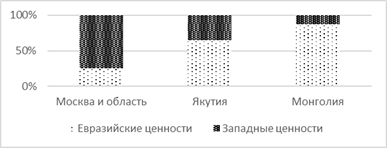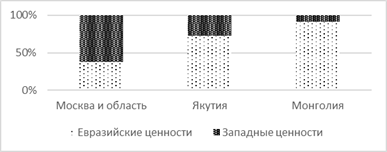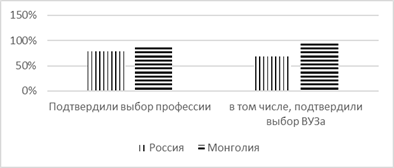Abstract
The article was prepared on the basis of summarizing the results of a field empirical study of the characteristics of the general and particular in the sociocultural, environmental and educational spaces that form the personality, lifestyle and incentives of students to learn in Russia, Yakutia, and Mongolia. The article contains a comparative analysis of the values and value orientations of teachers and students of pedagogical universities of Russia and Mongolia. The analysis of the values and value orientations of teachers and students is supplemented by a study of the main fears and apprehension of the surveyed contingent, its attitude to the profession and social activities. Differences are defined between the basic values of teachers of Yakutia, Mongolia and Central Russia, which must be taken into account when forming the worldview of a modern teacher. According to the study results and field expeditions in Mongolia to the rural settlements of Yakutia, questionnaires among school teachers, students, teachers of higher educational institutions of Russia and Mongolia identified the general (priority of Eurasian values), particular (traditionalism, paternalism, stability, ethnocultural stereotypes of behavior), and single ("nomadic" schools) peculiarities in the socio-cultural and educational spaces of Russia and Mongolia.
Keywords: Value orientation, educational space, Russia, Mongolia
Introduction
In the context of the globalization of education, if earlier it was a question of convergence and interpenetration of educational spaces, now, due to the development of information and communication technologies, integration processes in personality formation are becoming most relevant, taking into account the peculiarities of socio-cultural educational spaces of territories. They determine the peculiarities of assimilation of knowledge and incentives to receive it and actualize the role of the personality of the teacher as the main guide of knowledge, moral norms and values. Digitalization of educational processes reinforces this trend many times.
The most substantial factor which determines the effectiveness of the knowledge acquisition and the use of knowledge including professional is the system of values and value orientations of students. These value orientations are taken in many ways, it is worth pointing such moments as educational, ecological, social environments and media sphere where younger generation develops. A pedagogue plays the most important role in this process, transmitting values and value orientations not only in the process of learning, but also mostly in the process of education. In this case a person learns and adopts the decencies, the traditions, adopted rules and behaviour patterns, a historical and a cultural code, relations, a perception of the ways of a cognition of the world and a human.
In the interaction of the students with the systems of education, based on the use of informational and communication technologies without the contact with the pedagogue, the influence of the worldview and values on a learner, the perception and the acquisition of transferable knowledge become more impressive. A pedagogue determines the opportunity of an immediate incitement to the perception, acquisition and the ability of a correction of the perception.
The specialists of Russia, Yakutia and Mongolia are trained for an integration of the educational space for which it is very important and interesting to consider values and worldviews of learners and the pedagogues of the referred countries.
Problem Statement
The united national educational space of Russia implies a consideration of special features of the worldview and values, which were formed on different territories under the influence of a natural and sociocultural environment. The interaction and the integration of educational spaces of Russia and Mongolia possessing ancient historical roots also imply the consideration of the special features. The process of a future integration including the digitalization of educational systems of our countries requires modelling sociocultural, ecological and educational spaces of Russia and Mongolia with allocation of the general and special. The research paper focuses on a determination of the general, special and singularities in the national systems of education.
Research Questions
The subject of the article is the system of values of teachers and youth who form the personality, lifestyle and innovative thinking of students in Russia and Mongolia.
Purpose of the Study
Based on the authors' analysis of an empirical study of the general and special in the sociocultural, ecological and educational spaces of Russia and Mongolia, we offer recommendations for educational and other socio-humanitarian programs aimed at forming the personality, lifestyle and innovative thinking of students in Russia and Mongolia and the values of teachers and youth.
Research Methods
To characterize the general and special in the socio-cultural, environmental and educational range that form the personality, lifestyle and innovative thinking of students in Russia and Mongolia, an empirical study was conducted - field expeditions to Mongolia and the Far North of Russia.
At the first stage of the study, the methodological foundations of personality formation were analyzed (Abdulkhanova-Slavskaya, 1999; Abdullina, 1993; Alekseeva et al., 2018) for training of future teachers (Andrienko, 2019; Burinov, 2013). We emphasized the leading components of the personality structure, which are manifested in the characteristics of interests, goals, needs, personality settings with a fundamental emphasis on the values and value orientations of future teachers. Researchers present value orientations as a basic characteristic of a person (Vershlovsky, 2007; Vygotsky, 1982); the regulator of social behavior of the younger generation (Zaitseva, 2019; Zhuravleva, 2013) associated with spiritual and moral education and socialization of youth, as well as the process of formation of citizenship, citizen identity (Burinov, 2013; Nemirovskiy & Nemirovskaya, 2019).
At the second stage of the study, the authors define the methods for identifying the general and special in the ranges that form the personality of the future teachers of Russia and Mongolia. The questions of the questionnaire "Value Orientations" by A.V. Gavrilova, L.I. Novikova and of the questionnaires by S.S. Tambourine were adapted by the performers for this project. The questionnaire contained 7 blocks and 27 questions: block 1 identified the priority of the respondents' values; blocks 2–6 determined the respondents' assessment of the quality of the sociocultural environment; block 7 specified the impact of the ecological environment.
At the third stage, field expeditions were organized in Ulan Bator and administrative entities - aimaks (Mongolia), the Far North (Russia) with the aim of conducting empirical research of the general and the special in the sociocultural, environmental, and educational spaces of Russia and Mongolia.
At the fourth stage, the analysis, synthesis, generalization and representation of the collected research material was carried out. The total selection of respondents amounted to 975 people. 250 of them are respondents from Mongolia – students and teachers of Mongolian State University of Education, teachers of rural schools of the aimags (administrative districts) of Mongolia. 725 were Russian respondents: students and teachers of Moscow State Regional University (MSRU), M.K. Ammosov North-Eastern Federal University (NEFU), teachers of the urban district "City of Yakutsk", rural schools of uluses (districts) of the Sakha Republic (Yakutia).
At the fourth stage, the analysis, synthesis, generalization and representation of the collected research material were carried out.
Findings
The study of the value orientations of future teachers revealed that students of Mongolia and Yakutia (Russia) have Eurasian values (87 % and 65 %) as the main priority. Students and teachers of central Russia are characterized by the fact that they prioritize Western values (75 %). The priority of Eurasian values prevails among the surveyed teachers and teachers of Yakutia and Mongolia (79 % and 88 %) (Figure 1).

However, the older generation living in rural areas opted for traditionalism, paternalism, stability, family values and ethnic values, characterized as oriental (84 %).
Similar data was received by the project executors in 2017, 2018 (Nikolaeva et al., 2018b) (Figure 2).

Teachers of Mongolia and Yakutia (Russia) maintain ethno-cultural stereotypes of behavior based on their proximity to nature, cultural traditions, and ways of life. In their answers to the question, "What types of activities do you do after school/after hours?" respondents noted that family outdoor recreation, joint hunting, fishing, gathering, various activities related to house maintenance, livestock and animal care. At the same time, the existing socio-economic conditions are changing the mentality of ethnic groups, moving to the adoption of values that meet the globalization processes of the world and a change in technological patterns. When ranking significant values, teachers living in cities along with the values of family life (respecting the traditions of their people, traditional food, national clothes and the ability to maintain close ties with relatives and help each other) chose the opportunity to have a comfortable life, use the Internet, modern means of communication, pursuing a career and professional growth. These all together comprise Eurasian values.
Traditionally, higher education in pedagogy is relevant and in demand in regional education and in the whole country. A significant part of the respondents in our countries confirmed their choice of profession (79 % in Russia and 88 % in Mongolia), of which more than half of Russian respondents again chose a university (68 %), in which they received/are receiving a specialty. In addition, Mongolian teachers confirmed the choice of specialty and the choice of university almost completely (96 %). At the same time, the attitude to the institution of their choice is important. Thus, the assessment of the readiness of university students to live and work in modern conditions and to adapt to the labor market among Russian respondents is mostly "good", which is 80 %, "excellent" – 15 %, "satisfactory" – 5 %. Among Mongolian respondents, the percentage is as follows: "excellent" – 6 2%, "good" – 35 % and “satisfactory” – 3 %. For Russian students of central universities, such components as academic mobility, the ability to study or internship abroad are significant. At the same time, Russian teachers have a single (1 %) desire to change their occupation to generate more income (Figure 3).

Over a long historical period, in Mongolia, along with national foundations, the educational system has been characterized by the adoption of the Russian model of pedagogical school (Zhuravleva, 2013), which remains largely unchanged: pre-school, secondary, vocational, and higher education. At the same time, along with the reform of the economy and other areas of social development, changes in the education system of our countries are subject to training periods (6 years in primary school); organizational and legal forms of education (lyceums, gymnasiums; non-state, private schools / universities); the content of education (reduction of hours for studying the Russian language and increase in hours for studying other foreign languages), etc.
Distinctive features of the sociocultural, educational spaces of one of the northern Arctic regions of Russia are determined by natural and geographical conditions, traditional types of management, and specific ways of regulating human relations, the environment and nature (Nikolaeva et al., 2018a). In the education system of Yakutia, along with general education schools – complete and ungraded (with low occupancy), the so-called "nomadic" schools are preserved – a special type of general education school adapted to the resettlement route of reindeer herding brigades in the Far North (Silkova & Pleshkova, 2013). "Nomadic" schools, on the one hand, fulfill the target component of education - teaching reindeer herders' children in natural conditions – and on the other hand, contribute to preserving the traditional way of life, such as managing small peoples – reindeer husbandry. Thus, they form a worldview based on self-awareness and perception of different ways of understanding the world and man connected by relations to the native language, history of the genus, nature (Panina et al., 2015).
Conclusion
According to the results of the study and field expeditions in Mongolia to the rural settlements of Yakutia, questionnaires among schoolteachers, students, teachers of higher educational institutions of Russia and Mongolia identified the general (priority of Eurasian values), particular (traditionalism, paternalism, stability, ethnocultural stereotypes of behavior), single ("nomadic" schools) aspects in the socio-cultural and educational spaces of Russia and Mongolia.
Thus, differences are identified among the basic values of teachers in Yakutia, Mongolia and Central Russia, which must be taken into account when forming the worldview of a modern teacher.
References
Abdulkhanova-Slavskaya, K. A. (1999). Psychology and personality creation. VLADOS.
Abdullina, O. A. (1993). The identity of the student in the process of developing professional training. Higher education in Russia, 3, 165.
Alekseeva, I. S., Nadkin, V. B., & Osipova, O. P. (2018). The evolution of environmental ethics in Russia and Yakutia (post-Soviet period to the present). Knowledge. Understanding. Abilities, 2, 149.
Andrienko, O. A. (2019). Value grounds for building the process of education. Baltic Humanitarian Journal, 1(8), 192.
Burinov, A. M. (2013). The formation of a political culture in the context of the formation of Russian civil society. Philosophy of social communications, 4(25), 10.
Nemirovskiy, V. G., & Nemirovskaya, A. V. (2019). Social competitiveness of the youth and their perceptions of the socio-cultural environment (based on the research in a large Siberian region). Journal of the Siberian Federal University, 2(12), 206.
Nikolaeva, A. D., Filin, S. A., & Alekseeva, I. S. (2018a). The formation of an innovative worldview of a modern teacher in the context of the formation of a new system of values and a change in technological attitudes. Economics and management: problems, solutions, 9(6), 28.
Nikolaeva, A. D., Filin, S. A., Yakushev, A. Z., & Tserenchimed, S. (2018b). The origins of the formation of worldview ethics of a teacher in Mongolia. Pedagogics, 3, 109.
Panina, S. V., Makarenko, T. A., Egorova, R. I., Alekseeva, I. S., & Osipova, O. P. (2015). Peculiar features of teacher training at higher educational institutions in the Republic of Sakha (Yakutia). Mediterranean Journal of Social Sciences, 4(6), 395.
Silkova, K. A., & Pleshkova, I. A. (2013). Patriotism and patriotic education in the system of values of modern Russian youth. Bulletin of Novosibirsk State Pedagogical University, 2(3), 36.
Vershlovsky, S. G. (2007). Continuous education. SPbAPPO.
Vygotsky, L. S. (1982). Questions of theory and history of psychology. Pedagogics.
Zaitseva, I. A. (2019). To the question of the value orientation of young people in small towns as a reflection of the value priorities of modern society. In Youth and youth policy: new meanings and practices (pp. 165–171). Moscow.
Zhuravleva, N. A. (2013). The dynamics of young people's orientations to moral and ethical values is an urgent problem of modern Russian society. Psychological magazine, 5(34), 45.
Copyright information

This work is licensed under a Creative Commons Attribution-NonCommercial-NoDerivatives 4.0 International License.
About this article
Publication Date
17 May 2021
Article Doi
eBook ISBN
978-1-80296-106-5
Publisher
European Publisher
Volume
107
Print ISBN (optional)
-
Edition Number
1st Edition
Pages
1-2896
Subjects
Science, philosophy, academic community, scientific progress, education, methodology of science, academic communication
Cite this article as:
Alekseeva, I. S., Filin, S. A., Velikorossov, V. V., Erdene-Ochir, M., Chaykovskaya, L. A., & Yakushev, A. Z. (2021). Personality Formation And Innovation Of Thinking Of Students In Russia And Mongolia. In D. K. Bataev, S. A. Gapurov, A. D. Osmaev, V. K. Akaev, L. M. Idigova, M. R. Ovhadov, A. R. Salgiriev, & M. M. Betilmerzaeva (Eds.), Knowledge, Man and Civilization - ISCKMC 2020, vol 107. European Proceedings of Social and Behavioural Sciences (pp. 513-518). European Publisher. https://doi.org/10.15405/epsbs.2021.05.69

